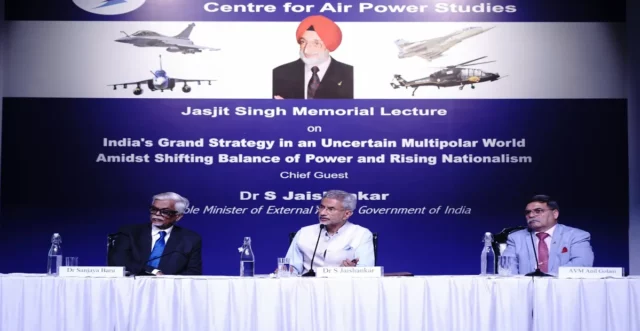External Affairs Minister S Jaishankar has stressed the need to recognise the role of rising nationalism is shaping world affairs.
He was addressing the seventh Jasjit Singh Memorial Lecture at the Centre for Air Power Studies in New Delhi, on Friday.
The theme was, ‘India’s Grand Strategy In An Uncertain Multipolar World Amidst Shifting Balance Of Power And Rising Nationalism.’
The World Will Become Significantly More Nationalistic
Jaishankar who has also been a career diplomat, said, “Like it or not, the world will be significantly more nationalistic in the foreseeable future.’’
He explained, “This means greater individualism, a stronger sense of caution on external commitments, and a global architecture that will be considerably less disciplined.’’
Merits Of Nationalism
“It was nationalism, after all, that triggered independence, growth, re-balancing, and led to multipolarity…,” he said.
He emphasised that India should clinically evaluate global happenings and make choices that are beneficial.
He further said, “Often, what is good for us as a national interest is also good for the world.’’
How Is Nationalism Perceived?
Jaishankar noted that the countries holding onto the old globalisation think that nationalism is a bad word.
“In those parts of the world where the old globalisation mantra still prevails, nationalism is a bad word.’’
However, the picture is understandably very different in the developing world, Jaishankar said.
India’s Relations With The Global South
He further commending India’s relations with the Global South.
“There are multiple divides and frictions in the world now, many of them overlapping.’’
He also explained that the fundamental one is between those powers competing for the top of the global hierarchy.
Jaishankar further said that in some cases, our interests are directly affected and we should not be timid about making choices that benefit us.
Optimal Approach
“By and large, the optimal approach would be to make our judgment and then seek common ground with similar players,” he said.
Meanwhile, he said that at times, situations could arise where the country needs to play its own hand.
A Multi-Vector Foreign Policy
In such circumstances, India should pursue a multi-vector foreign policy with national security and Comprehensive National Power (CNP) growth at its core.
India Will Continue To Grow
He said that India, which is currently the fifth largest economy in the world is likely to be the third soon.
He added, “With the kind of external interest that we have developed and will continue to grow, we cannot shirk responsibilities.’’
A Stable World Is In India’s Interests
He said that it is very much in India’s interests that this uncertain world is stabilised by rules, regimes and law.
Remembering Air Air Commodore Jasjit Singh
External Affairs Minister said that Air Commodore Jasjit Singh was a pioneer in bridging the uniformed and civilian domains, on the subject of national security.
Jaishankar further said that such endeavours contributed to the emergence of a more holistic view of national security.
How He Pursued India’s Interests?
“My takeaway from the many interactions with Jasjit was the manner in which he always put India’s interests at the centre of his thinking.”
The minister asked, “How would Jasjit have dealt with the world that we confront currently?”
He went on to say that he would have definitely applied himself to fashioning a grand strategy.
Global Landscape
In his concluding remarks, the minister said that the global landscape has changed and will continue to change.
He further said, “The task before us is to effectively address challenges and confidently exploit opportunities.’’
The World Is More Volatile Now
Jaishankar said that the world is unquestionably more volatile and more complicated now.
“But, I have little doubt that Air Commodore Jasjit Singh would have exhorted us to plan well to rise in an uncertain world.’’
















